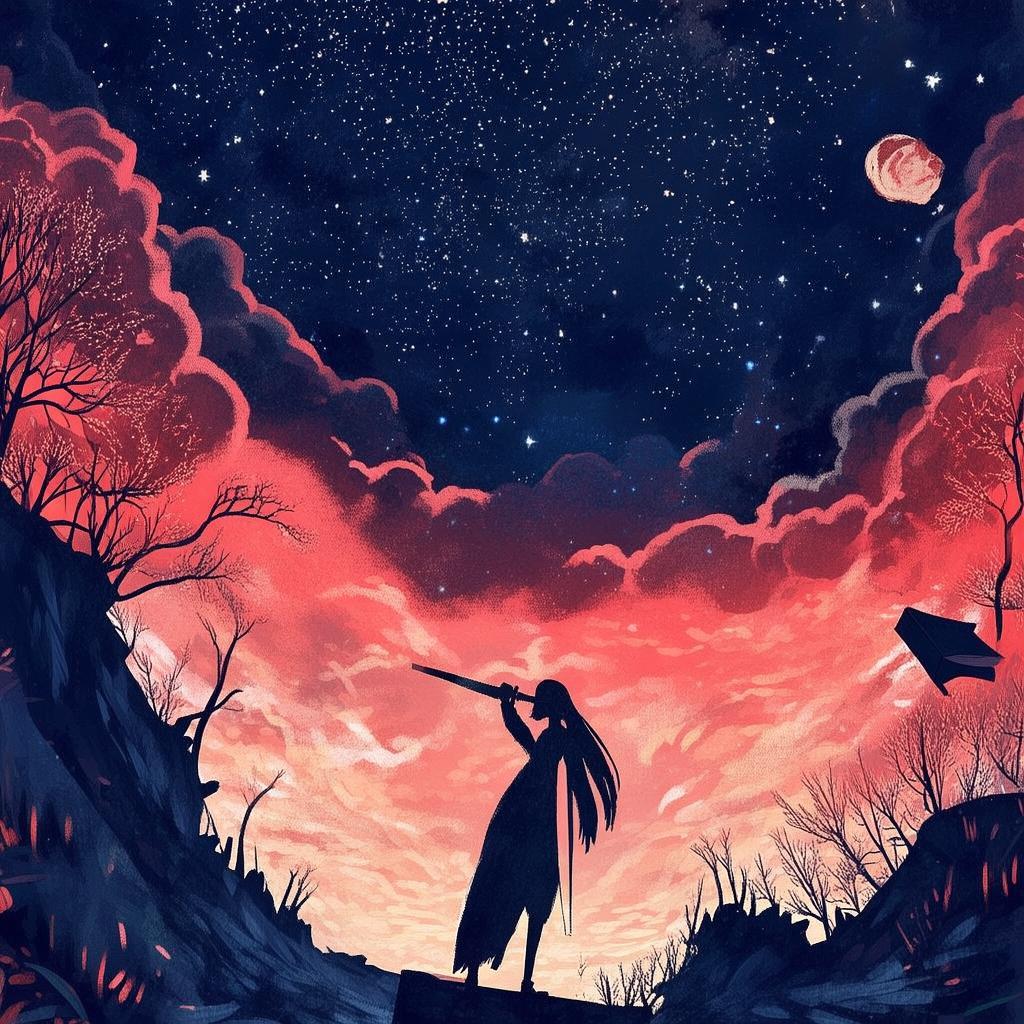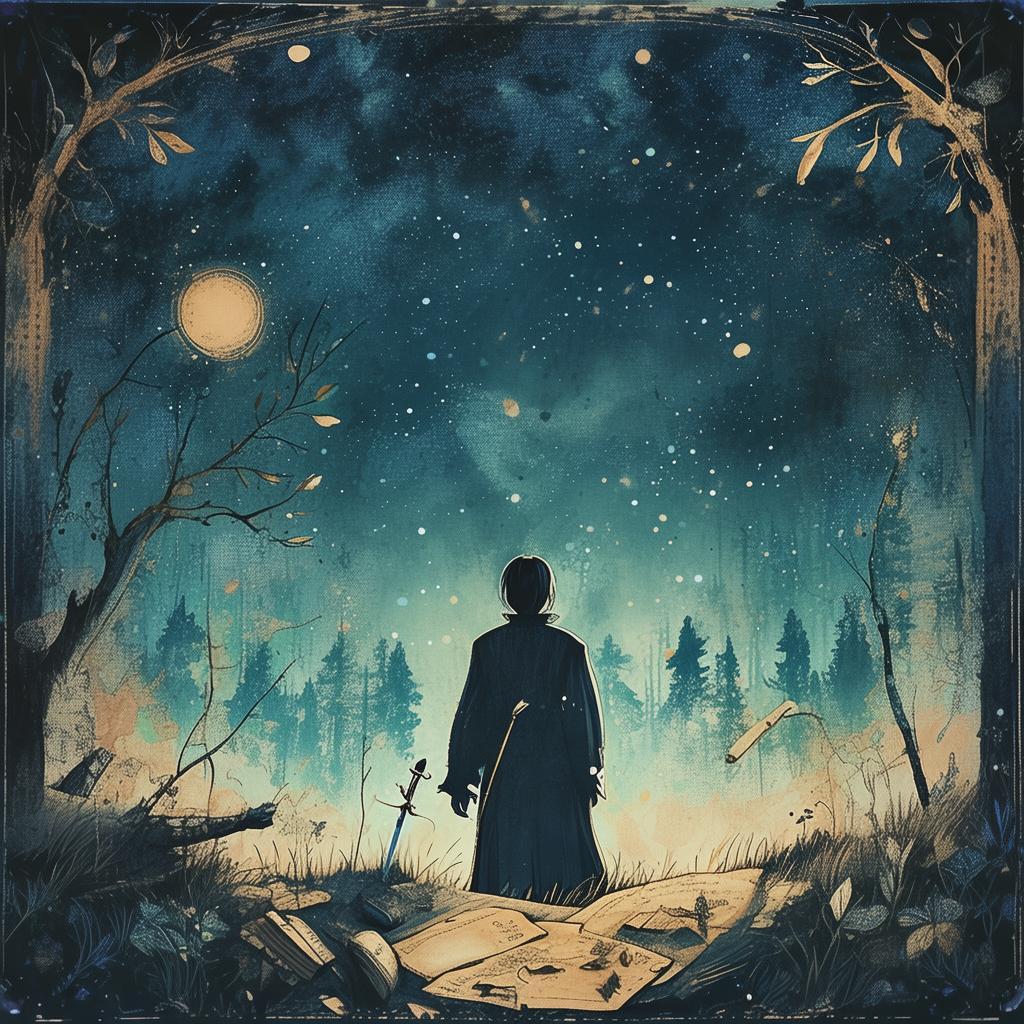The Resonant Requiem: A Symphony of Shadows
The night was shrouded in the hush of an ancient city, where the streets whispered tales of forgotten souls. In the heart of this city, a small, dimly lit music shop stood, its windows fogged with the breath of countless melodies that had found their way inside. The shop was run by an old man named Elion, whose eyes held the wisdom of ages and whose fingers had danced upon countless strings in the quiet of the night.
Elion was a collector of melodies, not just music, but the stories they carried. It was said that he could hear the emotions in every note, and that his collection was a tapestry of the human experience. One such melody was the Requiem, a composition that had been lost to time, its creator a man known only as the Shadow Composer, a name whispered in hushed tones among the musicians of the city.
The Requiem was a symphony of shadows, a haunting piece that spoke of loss and longing, of a soul searching for redemption. It was a melody that had never been performed, a requiem for a man who had never found peace.
One rainy evening, as the city was enveloped in a thick fog, a young woman named Lila stumbled into Elion's shop. Her eyes were red-rimmed from crying, and her hands trembled as she handed Elion a worn-out envelope. Inside was a score of the Requiem, with a note that read, "Find me when you need it most."
Elion's eyes widened, and he knew this was no ordinary melody. He had heard the whispers about the Shadow Composer, and now, it seemed, the composer had reached out to him. The score was a puzzle, a key to a door that had long been sealed.
Simultaneously, across the city, two other lives were about to intersect with the Requiem. There was Kael, a former soldier who had lost his voice in battle and now sought solace in the music of others. He had heard tales of the Requiem and felt a strange connection to it, as if it were a part of him that had been lost.
Then there was Emilia, a young musician who had been shunned by her peers for her unconventional compositions. She felt misunderstood, like the Shadow Composer himself, and the Requiem spoke to her in ways no other music ever had.
As the three lives began to weave together, each carrying their own burdens and secrets, the Requiem started to take on a life of its own. It was as if the melody had a will of its own, guiding them towards a common purpose.
Elion, the keeper of melodies, knew that the Requiem was more than just music. It was a message, a call to action, a reminder that even in the darkest of times, there is always hope. He began to teach Lila, Kael, and Emilia the intricate details of the Requiem, sharing with them the stories of the Shadow Composer and the pain that had driven him to create such a haunting piece.
The three students were drawn to the music, each finding a piece of themselves in the notes. Lila discovered that the Requiem was a reflection of her own past, a story of loss and the struggle to find one's place in the world. Kael found his voice again, not through words but through the music that had been stolen from him. And Emilia learned that her unique compositions were not a sign of her isolation but a testament to her individuality.
As the day of the Requiem's first performance drew near, the city buzzed with anticipation. The three musicians were to perform the piece in an old, abandoned church, its walls echoing with the echoes of forgotten prayers.

The night of the performance was cold, and the church was dimly lit by flickering candles. The audience was a mix of curious onlookers and those who had heard the whispers about the Requiem. As the musicians took their places, the air was thick with tension and anticipation.
Lila began to play, her fingers dancing across the keys with a grace that belied her struggles. Kael's voice was strong and clear, a testament to his journey. And Emilia's violin sang with a haunting beauty, weaving the melodies together into a tapestry of sound.
As the Requiem reached its climax, the church was filled with a silence that was almost palpable. The music was a requiem for the lost, a celebration of life, and a call to redemption. The audience was moved to tears, their hearts touched by the power of the music.
When the final note resonated through the church, the audience erupted into applause. The three musicians looked at each other, their eyes filled with a newfound understanding. They had found each other, and in doing so, they had found themselves.
The Requiem had been more than just a piece of music; it had been a journey, a path to healing and understanding. And as the music faded into the night, the city of shadows was filled with a new hope, a melody that would continue to resonate for generations to come.
✨ Original Statement ✨
All articles published on this website (including but not limited to text, images, videos, and other content) are original or authorized for reposting and are protected by relevant laws. Without the explicit written permission of this website, no individual or organization may copy, modify, repost, or use the content for commercial purposes.
If you need to quote or cooperate, please contact this site for authorization. We reserve the right to pursue legal responsibility for any unauthorized use.
Hereby declared.









